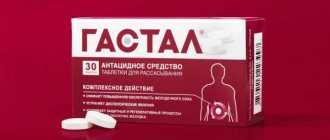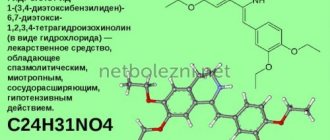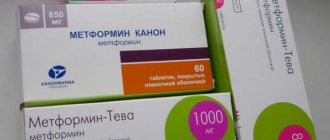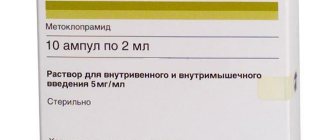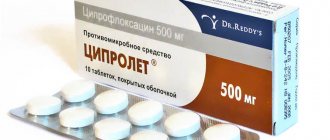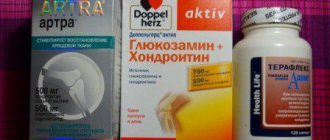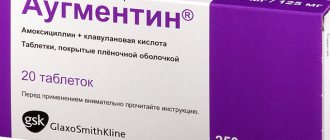Sulfanilamide drugs are known for having a fairly high antibacterial effect, so such drugs are often prescribed not only to adults, but also to children.
One of these representatives is Biseptol, which is available in several dosage forms, so after reading the instructions for use and reviews, today we want to talk in more detail about this product and when it is advisable to give it to children.
Release form
According to the official instructions for use, Biseptol for children is available in the following dosage forms:
- A suspension or syrup that has a sweet taste and pleasant aroma, so in most cases children drink the medicine with pleasure.
- Tablets with a dosage of the main substance of 120 mg and 480 mg.
- Liquid for injection. This form is used for children over 6 years old, and only if there is an emergency.
What kind of drug is this
Biseptol syrup is a combination drug from the group of bactericidal drugs. The medicine has a wide spectrum of bactericidal effects on the body. The drug is active against most existing pathogenic microorganisms. Biseptol is used to treat many diseases accompanied by infectious and inflammatory processes.
The mechanism of action of the drug consists of the following properties:
- blocking folate biosynthesis in microbial cells;
- relief of the general condition of the body;
- inhibition of the vital activity of E. coli;
- destruction of pathogenic microorganisms;
- blocking bacterial metabolism;
- reducing the risk of developing complications of the existing disease;
- strengthening the body's protective functions;
- prevention of relapse of infectious disease;
- normalization of metabolic processes in the body;
- bactericidal effect.
Compound
Regardless of the form of release, the main component of the drug is co-trimoxazole, a substance consisting of two components: sulfamethoxazole and trimethoprim.
Additional components vary depending on the release form. The tablets contain:
- potato starch;
- talc;
- magnesium stearate;
- polyvinyl alcohol;
- methyl parahydroxy- and propyl parahydroxybenzoate;
- propylene glycol.
The suspension (syrup) contains the following auxiliary components:
- macrogol (polyethylene hydroxystearate);
- carmellose sodium;
- aluminum-magnesium silicate;
- citric acid monohydrate;
- sodium hydrogen phosphate dodecahydrate;
- methyl parahydroxybenzoate;
- propyl parahydroxybenzoate;
- liquid maltitol;
- sodium saccharin;
- strawberry flavor.
After reviewing the detailed composition indicated in the instructions, we can say the following: the drug in tablet form is safer, because it does not contain such a large number of different substances as in the suspension, which is especially important for children prone to allergies.
Contraindications
The drug is prescribed with caution for alcohol dependence, bronchial asthma, and in old age. Contraindications:
- intolerance to the components of the composition;
- damage to the liver parenchyma;
- porphyria;
- age up to 3 years for concentrate and tablets, up to 3 months for suspension;
- pregnancy, lactation.
Operating principle
The active components that make up the drug have bactericidal properties, which determines the effect of Biseptol as a whole. Once in the body, they inhibit the synthesis of proteins necessary for the active development of bacteria, disrupting it and provoking the death of pathogenic microbes.
The drug has a wide spectrum of action and fights against many pathogenic agents (enterococci, E. coli, pneumococci, salmonella, shigella, pneumocystis, etc.).
Composition and principle of action
When is Biseptol used and how much should you take it? One Biseptol 120 mg tablet contains 100 mg of sulfamethoxazole, 20 mg of trimethoprim and additional components. Accordingly, a dose of 240 mg or 480 mg contains two and three times more active substances. The combined effect of the drug components is aimed at inhibiting the formation of folic acid in the bacterial cell. The substances are selected in such a way that they enhance each other’s effects. This adds to the effectiveness of the drug.
Its action occurs as follows:
- sulfamethoxazole - has a structure similar to para-aminobenzoic acid, due to which it interferes with the formation of folic acid;
- trimethoprim - slows down the transition of vitamin B9 precursors to the active form.
Thanks to this, minimal concentrations of folic acid are created, which is essential for the growth and development of bacteria. "Biseptol" in high concentration causes the death of pathogens sensitive to it and, thus, eliminates the infection.
The activity of the drug applies to the following microorganisms:
- coli;
- streptococci;
- staphylococci;
- pneumococci;
- typhoid and dysentery bacteria;
- gonococci;
- salmonella;
- hemophilus influenzae;
- Klebsiella;
- enterococcus;
- chlamydia;
- toxoplasma;
- leishmania.
The product has no effect on Pseudomonas aeruginosa and tubercle bacilli, Leptospira, spirochetes and viruses.
Indications
For children, Biseptol can be prescribed in a variety of situations, such as:
- Infections of the upper and lower respiratory tract and infectious diseases of the ears (sinusitis, purulent otitis, bronchitis, pharyngitis, bronchiectasis, tonsillitis, pneumonia, laryngitis, pharyngitis, etc.).
- Infections of the genitourinary system (cystitis in various forms, urethritis, pyelonephritis, prostatitis, etc.).
- Infections of the digestive tract (salmonellosis, typhoid fever, cholera, bacterial diarrhea).
- Whooping cough, scarlet fever, furunculosis, purulent inflammation of the skin, osteomyelitis.
When to use
Modern doctors prescribe Biseptol for pathologies caused by pathogenic microbes susceptible to the effects of sulfamethoxazole. The method of application is indicated in the table.
Table - Conditions for which the use of Biseptol tablets and powder for injection is recommended
| Organs or organ systems | Pathology |
| Upper respiratory tract | — Chronic and acute bronchitis; - inflammatory lesion of the pleura; - pneumonia; - abscesses; - inflammatory complications of bronchiectasis; - laryngitis |
| ENT organs | - Otitis; — sinusitis (for example, sinusitis, frontal sinusitis); - inflammation of the tonsils (tonsillitis); - infectious process in the mucous membrane of the larynx and pharynx |
| Genitourinary organs | — Inflammation of the uterine appendages; - prostatitis; - urethritis; - cystitis; - epididymitis; - chronic pyelonephritis; - gonorrhea |
| Digestive system | — Diarrhea of bacterial etiology, including food poisoning; - inflammation of the bile ducts |
| Leather | — Acne; - purulent lesions of hair follicles and soft tissues |
| Severe infectious and inflammatory diseases with high fever | - Meningitis; - sepsis; - purulent bone marrow lesions; - severe infections after injuries |
"Biseptol" is effective against toxoplasmosis and malaria. Biseptol is prescribed for children in case of contraindications to antibiotics or an allergic reaction to commonly used drugs. High effectiveness of treatment is achieved for sore throat, cough with bronchitis, as well as sinusitis, inflammation of the lungs, middle ear, intestinal infections, furunculosis, and enlarged lymph nodes. It should be used only as prescribed by a doctor.
At what age is it allowed to take
In the instructions we find that the medicine in tablet form is approved for children from 3 years of age, but if it is necessary to use it for smaller babies, then it is possible to use a suspension or syrup, which is approved for newborns from two months.
You should not prescribe such a remedy to your baby on your own, although it is not considered an antibiotic, it is still a bactericidal agent, and it affects the further functioning of the gastrointestinal tract (GIT), so it is better to first consult a doctor who can not only prescribe the necessary therapy , but also the correct dosage, taking into account the individual characteristics of the child.
How to take Biseptol for children and adults
For ease of use, Biseptol is available in different dosage forms.
- The tablet form is available in two dosages:
- 120 mg - for children;
- 480 mg - for adults.
- Suspension for children with strawberry scent in a bottle of 80 ml. 1 dose - 5 ml contains 240 mg of active substances.
- Concentrate for preparing a solution for infusion. 1 ampoule contains 480 mg of active substances.
How to take Biseptol and in what dosage forms depends on the disease and age of the patient.
Treatment in adolescents and adults:
The minimum dose for treatment longer than 14 days is 480 mg every 12 hours. The standard dosage is 960 mg twice a day; for severe infections, the dose is increased to 1440 mg every 12 hours.
- The course of treatment for respiratory tract and ENT infections is ten days.
- Treatment of inflammatory diseases of the genitourinary system lasts from fourteen to twenty-one days.
- Diseases of the gastrointestinal tract are treated for at least five days.
- Treatment for infectious diseases of the genital organs (chancroid) lasts from seven to fourteen days.
- To treat acute urinary tract infections in women, “shock” therapy is used, in which a single dose is up to 2880 mg.
- Pneumonia is treated with 960 mg twice a day. The individual dosage is calculated at 30 mg/kg.
- Nocardiosis is treated at a dosage of 2880 mg for at least three months, acute brucellosis - four weeks, typhoid fever - three months.
Contraindications and side effects
The instructions devote a lot of space to contraindications and side effects. It states that Biseptol cannot be used if:
- The child has hypersensitivity to any component of the medicine.
- There is a history of renal failure or other kidney diseases.
- If there is liver damage or disease.
- The baby has a deficiency of glucose-6-phosphate dehydrogenase.
- The baby has blood pathologies such as leukopenia or agranulocytosis.
- Presence of thyroid pathologies.
- Deficiency of B vitamins in the body, in particular B9 and B12.
Adverse reactions, unfortunately, do occur, and they are as follows:
- dizziness;
- headache;
- depression of general condition;
- hematopoietic disorder;
- cough and shortness of breath;
- pain in joints and muscles;
- kidney dysfunction;
- convulsions;
- allergic manifestations on the skin.
If a child develops such symptoms, you should stop taking the drug and consult a doctor as soon as possible.
Features of the drug use
Biseptol is effective against the development of infection in the upper respiratory tract, but for maximum effect in the human body it is important to take into account the specifics of using the medicine.
- For allergy sufferers, the medicine is prescribed with increased caution.
- Children and elderly patients are under special supervision during treatment.
- If you need to use the drug for a long period of time, you should constantly monitor the biochemical parameters of the blood, and you may need to prescribe folic acid.
- Control of daily urination is necessary. If little urine is produced, this indicates that kidney function is reduced and there is a risk of toxic or allergic complications.
- When treating with Biseptol, it is important to eat mainly vegetable dishes.
- You should not stay in the sun for a long time.
- The drug is ineffective against tonsillitis and pharyngitis.
Instructions for use and dosage
Biseptol in the form of tablets is given to children after meals, and it should be washed down with water. The dosage is prescribed depending on the age and clinical picture of the disease. The instructions indicate the following dosages:
- Children from 3 to 5 years old are allowed 240 mg of the drug per day, i.e. 2 tablets of 120 mg each.
- From 6 to 12 years – 480 mg, i.e. 4 tablets of 120 mg or 1 tablet with a concentration of 480 mg.
You should not give the entire dose at one time, but it is better to take the medicine 2 times a day, with a 12-hour break between doses.
The medicine in the form of a suspension is also given after meals. First, you need to shake the bottle of liquid well, measure out the required amount and let your baby drink. It is assigned as follows:
- Newborns from 3 to 6 months – 2.5 ml 2 times a day.
- Children under 3 years old – 5 ml 2 times a day (morning and evening).
- Toddlers from 3 to 6 years old are allowed 5-10 ml every 12 hours.
- Children from 7 to 12 years old are prescribed 10 ml of syrup or suspension 2 times a day.
- Adolescents over 12 years of age are prescribed an adult dosage, i.e. 20 ml in the morning and evening.
On average, the duration of treatment is 1-2 weeks.
Reviews
I consider Biseptol to be an old, reliable, proven drug that helps in solving problems not only of diseased respiratory organs, but also of ulcers, styes, and diarrhea. She successfully treated herself and her children with it. I know that it is bad for the liver, so I consumed it only after eating and drinking milk. In the battle with bronchopulmonary diseases, it is necessary to take 4 tablets per day, 2 at equal intervals for 3-5 days, depending on the severity. For ulcers, 1-2 single doses of 2 tablets are enough, and from diarrhea it saves from one dose of the same number of tablets. Wonderful drug!
Olga M., https://protabletky.ru/biseptol/#otzivi
I know that this antibiotic was used a long time ago. And it was, in principle, a traditional medicine for many diseases. And about 10 years ago I had to experience it myself. But my experience of using this drug is a little negative. I'll tell you why - I had an attack of kidney disease. I was just at the sanatorium. The doctor prescribed me this antibiotic. True, everything became normal with the kidneys, but I fell ill with thrush when I arrived home. I didn't even know what it was. I went to my doctor and told everything. And he explained to me that after treatment with Biseptol, our bacteria are killed and you can get thrush. So then I treated something else and try not to use it anymore.
Elizaveta T., https://protabletky.ru/biseptol/#otzivi
I took this drug for many years, took it on the road, for poisoning, and yesterday I almost kicked it off, thanks to the intensive care unit. Within 10 minutes, my entire face was swollen, my pulse was over 200, my entire face was covered in a rash, my tongue couldn’t speak at all, so be careful—many people take this drug on vacation. Previously, there were no allergies to Biseptol, as well as to other drugs.
Dmitry, https://www.tiensmed.ru/news/biseptolusi1.html
Since childhood I have been treated with Biseptol. I just believe him, I guess. In general, any medicine always has side effects. And the package insert, as well as a consultation with a doctor, coupled with test results, is the best prevention of any side effects of any medicine.
Irina, https://www.tiensmed.ru/news/biseptolusi1.html
Interaction with other drugs
- According to the instructions, you should not take the medicine with milk, as it sharply reduces the effectiveness of the medicine.
- Before taking the drug, you should avoid foods that are quickly absorbed by the body and excreted from the intestines, for example, dried fruits.
- A maintenance diet is important during treatment. It is worth giving up fatty foods, peas, beans, cabbage and tomatoes for this period.
- Biseptol is not recommended for use simultaneously with aspirin and substances that inhibit hematopoiesis.
- You should also be careful when taking diuretics, as the drug increases the risk of thrombocytopenia.
- The instructions indicate that if you take Biseptol and hypoglycemic substances, indirect anticoagulants, phenytoin or methotrixate, it enhances the therapeutic effect of the latter.
special instructions
When taking Biseptol, there is a risk of salt crystals appearing in the urine and the formation of kidney stones, therefore, to prevent such side effects throughout treatment, it is necessary to drink enough fluid and monitor tests.
Concomitant use of the drug with diuretics increases the risk of hypokalemia (low potassium in the blood) and bleeding. During the treatment period, it is recommended to completely abstain from alcohol so as not to provoke toxic hepatitis. With long-term therapy, it is necessary to take tests to monitor the functional state of the kidneys, liver and monitor hematological parameters.
Analogs
There are many different antibacterial drugs that are not antibiotics that can be used as an analogue of Biseptol.
These include:
- Co-trimaxozole;
- Bactrim Forte;
- Bi-septin;
- Sulgin;
- Sulfadimethoxine;
- Sulfadimezin.
Features of use
In order for the effect of treatment with Biseptol to bring good results, it is important to follow some rules during its use:
- Before giving the prepared Biseptol syrup to a child, you need to shake the bottle.
- There should be at least 12 hours between doses of the medication.
- During the intake process, strictly adhere to the prescribed dosage.
- Biseptol for children should be taken after meals.
- In combination with Biseptol, you need to take probiotics, which can protect the intestines from the development of dysbiosis.
- The drug should be taken only as prescribed by a doctor.
- Treatment should not exceed 5 – 10 days.
It is important to understand that Biseptol suspension is intended for the treatment of bacterial diseases. The drug does not act on viruses and cannot be used for prophylactic purposes.
Biseptol suspension for children - reviews
- kreative91 shares his review. Her nephew lives with her, and in 3 months he was sick as many as 5 times. At his next appointment with the doctor, he was prescribed the drug in the form of a suspension. Despite all the contraindications and frightening side effects described in the instructions, they decided to try it and began giving Biseptol to the boy. They had a course of treatment for 10 days, and the child’s condition improved significantly, so she recommends this remedy.
- The daughter of a Lex-Ta user suffers from an anomaly in the development of the genitourinary system, so the nephrologist often changes medications to avoid addiction, so she was prescribed this drug in the form of a suspension. Although the drug is quite old, it is effective. There were no side effects and the baby felt fine.
- And here is the story of Region66. She has two kids, and they are often prescribed antibiotics, which does not reflect well on the future functioning of the gastrointestinal tract. One day she was advised Biseptol, because it does not have such a negative effect on the intestines and is quite effective. After reading the instructions, she began giving it to the kids, and the effect appeared after a few days.
- The daughter of user ula1981 goes to kindergarten, and it so happened that she was frozen and developed cystitis. She wrote often, even wrote down her bed at night. The doctor confirmed the diagnosis and prescribed Biseptol. On the 3rd day of treatment, a positive effect was already noticeable, and by the end of the treatment my daughter had fully recovered.
- User lola03 has a son, and he gets sick often, they even stopped going to kindergarten. He developed a cough that did not go away for a long time. We were treated with various medications, but there was no effect. Then the doctor recommended trying Biseptol. As a result, the cough decreased, but did not completely go away. In principle, there is an effect, and this therapy has significantly improved the baby’s condition.
Biseptol instructions for children.
Biseptol is an antibacterial drug that allows you to cope with various infectious diseases. First of all, it should be noted that Biseptol does not belong to the group of antibiotics, but still its mechanism of action is aimed at destroying various infections. Most often, Biseptol is prescribed to children for bacterial diseases of the bronchi and lungs. It is widely used for pneumonia, bronchitis, otitis media or sore throats. The drug has also found wide use in cases of soft tissue damage, intestinal infections or bacterial diseases of the genitourinary system.
The drug Biseptol in the form of a suspension belongs to antimicrobial drugs from the sulfonamide group. It is a combination drug because it contains 2 active components, each of which has its own effect.
A few years ago, the drug Biseptol was one of the most popular antibacterial drugs. It has been widely used in various fields of medicine to treat bacterial diseases. At the moment, many doctors have refused to prescribe it and prefer more modern drugs. Despite the controversial attitude towards the drug, Biseptol in suspension is present in almost every pharmacy. Moreover, it is prescribed for children, considering it one of the time-tested and available drugs. Considering the ambiguous opinion of doctors about the drug, parental reviews of Biseptol are quite good. To understand the positive and negative aspects of the drug, it is important not only to consult a pediatrician, but also to study the package insert with instructions.
Helpful information
Quite often we are faced with the fact that children sometimes have to be given broad-spectrum antibiotics, and today there is a huge range of such products.
Augmentin is considered a fairly common drug, and in some cases doctors may recommend Flemoxin Solutab or another representative of the antibacterial agents Hemomycin.
If this information is interesting to you or you want to learn more about these medications, we recommend that you read their instructions for use and reviews.
Have you ever given Biseptol to your baby, and what was the effect after treatment? Were there any side effects, or did the body respond well enough? Share your tips and reviews in the comments if you have had to deal with this medicine. And also do not forget to leave your feedback on the article you read.
Indications for use of Biseptol
Instructions for use indicate the following indications for the use of Biseptol:
- otitis media;
- typhoid fever, paratyphoid fever, gastroenteritis, dysentery, cholera;
- tonsillitis, bronchitis, bronchopneumonia, laryngitis, stomatitis;
- malaria, meningitis;
- pyelitis, pyelonephritis;
- sinusitis;
- cholangitis;
- scarlet fever;
- nocardiosis, brucellosis, toxoplasmosis;
- actinomycosis, South American blastomycosis.
pharmachologic effect
The drug "Biseptol" has a bacteriostatic effect on various types of pathogens. Sulfamethoxazole disrupts the metabolism of bacteria, including preventing the synthesis of dihydrofolic acid in their cells. Trimethoprim prevents the formation of nucleic acids necessary for the growth and reproduction of microorganisms, which leads to their rapid death. The active components of Biseptol tablets are absorbed in the small intestine. They penetrate into body fluids and tissues: kidneys, lungs, tonsils, prostate gland, vaginal and bronchial secretions. Sulfamethoxazole and trimethoprim cross the placental barrier and can be excreted in breast milk during lactation. 60 minutes after taking the drug, the concentration of active substances in the blood reaches the maximum value. The therapeutic effect lasts for 12 hours. The drug is eliminated from the body within 10-12 hours, mainly in the urine. So, we looked at what effect the drug “Biseptol” has. We will tell you further what it helps with.
Characteristics of the drug
Before starting drug therapy, you need to understand what Biseptol is, what it helps with, and how it differs from other potent drugs. Biseptol is a drug that has all the properties of a combined antimicrobial agent. Its action is aimed at eliminating a number of dangerous pathogens that provoke serious diseases in the body. Biseptol is a medicine that has all the features of a bactericidal drug with a wide spectrum of action.
The medicine is characterized by increased activity against a number of microorganisms, but its bactericidal properties do not apply to all pathogens. Some pathogenic bacteria, fungi and protozoa are considered resistant to this drug.
The active components of Biseptol are trimethoprim and sulfamethoxazole. Trimethoprim is a substance that enhances the properties of the second component. Sulfamethoxazole takes an active part in disrupting the synthesis of dihydrofolic acid in bacterial cells. The combination of such substances leads to disruption of protein metabolism in the cells of the pathogen, which negatively affects its division.
Biseptol is available in the form of tablets with various dosages, intended for the treatment of pathologies in children and adults. In hospitals you can find the medicine in the form of ampoules containing a concentrate, from which solutions are subsequently prepared for intravenous administration into the patient’s body. Another form of release of Biseptol is a suspension intended for the treatment of disease in young children.
Should I take the drug or not?
What is Biseptol? This medicine belongs to the antimicrobial class. The advent of antibiotics has significantly reduced the use of sulfonamides. Currently, Biseptol is practically not used:
- Taking it for a common cold or flu is absolutely useless, since it has no effect on viruses. As a result, instead of a therapeutic effect, the individual receives only a side effect. If these diseases are aggravated by a bacterial infection, then only the attending doctor should select the necessary remedy.
- Use for cystitis in some cases can achieve good results. However, its frequent and uncontrolled use over a long period leads to a decrease in effectiveness and the emergence of resistance to its components. Temporary relief is accepted by many patients as a complete cure. As a result, the disease enters a latent chronic stage and does not manifest itself for a long time, which is subsequently fraught with serious complications.
- Taking it for intestinal infections is in most cases unjustified, despite the fact that Biseptol is active against E. coli.
For infectious pathologies whose pathogens are sensitive to Biseptol, it is still recommended. Pathogenic viruses, Treponema, Koch's bacillus, Leptospira are resistant to its action. Bacterial resistance to this drug develops very quickly, so the recommended course of treatment should be followed.
Drug interactions
- phenytoin: the intensity of hepatic metabolism of phenytoin decreases, which is why its effect and toxic effect are enhanced;
- diuretics (most often thiazides and in elderly patients): the risk of thrombocytopenia increases;
- drugs that inhibit bone marrow hematopoiesis: the risk of myelosuppression increases;
- ACE inhibitors (angiotensin-converting enzyme): hyperkalemia may develop (the risk is especially high in elderly patients);
- indirect anticoagulants: anticoagulant activity increases (adjustment of anticoagulant doses is required);
- digoxin: its serum concentration may increase, and therefore it is necessary to monitor digoxin serum concentrations (the risk is especially high in elderly patients);
- dofetilide: dofetilide Cmax increases by 93%, AUC increases by 103%, such an increase in dofetilide concentration can cause ventricular arrhythmias with prolongation of the QT interval, including feasting type arrhythmias (this combination is contraindicated).
Treatment of prostatitis
What do Biseptol tablets help with? It turns out that their use in the treatment of prostatitis is quite justified. Doctors recommend taking them if the disease is infectious. The active substances of the drug penetrate the prostate tissue and have a detrimental effect on pathogenic microorganisms. Reducing the activity and number of bacteria relieves swelling of the prostate, reduces pain, and also eliminates other symptoms of the disease. The course duration lasts at least two weeks. In the first days of treatment, the doctor prescribes the maximum allowable dose, then it is reduced. After a couple of days, the individual feels relief. At this point, it is important not to interrupt the course of treatment to prevent the development of a chronic form of the disease. During therapy, it is very important to follow the doses prescribed by the doctor. Otherwise, serious adverse events are inevitable.
Dosage form
The medicine Biseptol for coughs and colds is presented by the manufacturer in:
- tablet version (480 mg for adult patients and 120 mg for small patients).
- ampoules (480 mg).
- suspension (240 mg).
The use of medicine in ampoules is permitted only in medical institutions, where it is used as a basis for solutions during intravenous infusions.
Most often, for the treatment of the adult population, Biseptol is prescribed in tablets, and for young patients - in the form of a suspension.
Pills
You may be interested in: Lumps behind the ears: causes and treatment
Biseptol 480 tablets are white with a yellowish tint, round, flat in shape, scored and engraved “Bs”. They contain trimethoprim and sulfamethoxazole (as active ingredients), as well as auxiliary ingredients: potato starch, polyvinyl alcohol, magnesium stearate, talc, methyl parahydroxybenzoate, propylene glycol, propyl parahydroxybenzoate. They are packaged in red blisters of 14 pieces (2 blisters in a cardboard package) or 20 pieces (1 blister in a package).
Reviews of Biseptol 480 tablets are mostly positive. The drug is popular among consumers.
Why is Biseptol® classified as an antibiotic?
Thus, in all respects, Biseptol fully corresponds to the concept of “antibiotic”. Then where does the information come from that it is not such and does not give characteristic side effects (that is, less harmful to the body)? To answer this question, you should briefly familiarize yourself with some historical information, the principles of manufacturing antimicrobial drugs and the characteristics of the drug itself.
Read further: Biseptol® - complete instructions for use of tablets and suspension
A little history
Biseptol belongs to the group of sulfonamide antibiotics - synthetic antimicrobial drugs, the history of whose discovery is quite interesting.
The first of them was synthesized long before penicillin (in 1908) and was named Sulfanilamide®.
It is noteworthy that this compound was initially considered an industrial dye, and the chemotherapeutic properties of its component - prontosil (or red streptocide) - were discovered later, in 1934. A year later it was found that only the sulfonamide group formed as a result of metabolism ("white streptocide”, without dye), which is still used in medicine today.
As a result of numerous experiments and studies over the past years, various drugs based on sulfonamide® and its derivatives have been obtained. The modification led to an expansion of the spectrum of antimicrobial activity and overcoming the resistance of pathogens (most of them are currently resistant to the first generation of drugs). Thus, Biseptol® is a combination of sulfamethoxazole with trimethoprim (co-trimoxazole®), in which the components act synergistically, preventing the synthesis and absorption of folic acid necessary for cell development.
Indications and release form
Information about its antimicrobial activity will help to answer the question in the affirmative whether Biseptol® is an antibiotic or not:
- effective against staphylococci and streptococci (gram-positive flora);
- Of the gram-negative pathogens, E. coli, Vibrio cholerae, salmonella and many others are sensitive to it.
Not active against treponema, mycoplasma, mycobacteria, Pseudomonas aeruginosa.
Thus, this drug exhibits antibacterial properties characteristic of antibiotics and is successfully used to treat infectious inflammation of the digestive, respiratory, genitourinary, skin, muscles, and subcutaneous tissue.
The original drug is produced by the Polish concern Medana Pharma in the form of tablets (dosage of co-trimoxazole 120 and 480 mg), suspension for oral administration, concentrate for the production of infusion and injection solutions.
This range of dosage forms allows you to accurately calculate the required amount of the active substance and create an optimal treatment regimen for a patient of any age. Self-medication (especially in relation to children) is strictly forbidden. In addition, it is necessary to strictly and strictly adhere to medical prescriptions and not interrupt treatment earlier than after 5 days, if there are no negative reactions from the body.
Application, side effects and contraindications
Due to the peculiarities of absorption and excretion from the body, it is usually prescribed twice a day. You should take the tablets after meals with a sufficient amount of boiled or filtered water (at least a glass). A single dose for an adult and a child over twelve years of age ranges from 240 to 960 mg, depending on the nature and severity of the specific disease. The amount of active substance required for younger children is calculated according to weight.
Biseptol® has a number of strict contraindications and side effects. The latter do not occur often; disorders of the gastrointestinal tract (diarrhea, abdominal pain, nausea or vomiting) and central nervous system (headache, insomnia) are mainly observed. Less common are allergic reactions in the form of a rash, as well as dysfunction of the kidneys and liver (hematuria, hepatitis). All negative consequences disappear immediately after discontinuation of drug treatment with sulfonamides.
It is strictly forbidden to take the medicine if you are hypersensitive to any components, as well as the following categories of people:
- pregnant women at any stage, since the placental barrier practically does not interfere with the absorption of co-trimoxazole®, and the teratogenic effect manifests itself in the form of heart defects in the fetus;
- breastfeeding (you should temporarily stop breastfeeding and express milk so that lactation does not stop);
- those suffering from diseases of the liver, kidneys, as well as the cardiovascular and hematopoietic systems;
- children under three years of age (tablet form). However, Biseptol in the form of a suspension or solution can be used from the third month of life.
In addition to the strict prohibitions listed above, a number of restrictions are imposed on the use of the drug. Caution is required if the patient is diagnosed with thyroid disease, asthma, or vitamin B9 deficiency. In addition, if the duration of the course of antibiotic therapy exceeds the minimum period of 5 days, it is necessary to monitor blood counts and, possibly, additionally take folic acid supplements.
Recommended doses and duration of taking tablets
The use of "Biseptol 480" in tablets is indicated for adults and children over twelve years of age in the following daily dose:
- in the normal course of the disease and chronic pathology - 960 mg, divided into two doses;
- for severe cases – 1,440 mg, and the multiplicity increases to three.
The minimum course is four days. After the signs of the disease disappear, continue to take the pills for another two days. For chronic infections, the duration of therapy is determined by the attending doctor.
Below are the daily doses and course intake of Biseptol for the treatment of some serious anomalies:
- Gonorrhea – 1,920–2,880 mg. This dose is divided into three doses.
- Gonorrheal pharyngitis – 4,320 mg. Take once a day for five days.
- Pneumonia caused by Pneumocystis carinii - the dose is calculated at 120 mg per kilogram of the patient’s weight. Take every six hours for fourteen days in a row.
- For prophylactic purposes for urinary tract infections - 480 mg at a time for adults and children over twelve years of age. For children under this age, the dose is determined as follows: 12 mg multiplied by the baby’s weight. The duration of treatment is from three months to a year.
- Acute cystitis in children from seven to sixteen years old - 960 mg twice a day, taken for three days.
Overdose
Main symptoms:
- sulfamethoxazole: vomiting, nausea, intestinal colic, lack of appetite, headache, dizziness, loss of consciousness, drowsiness; It is also possible to develop fever, hematuria, and crystalluria. Later symptoms include jaundice and bone marrow suppression;
- trimethoprim (acute poisoning): depression, vomiting, nausea, headache, dizziness, bone marrow depression, disturbance of consciousness.
It is unknown what dose of co-trimoxazole may pose a threat to life.
Chronic poisoning with co-trimoxazole (with long-term use in high doses) can lead to suppression of bone marrow function, manifested by thrombocytopenia, megaloblastic anemia or leukopenia.
Therapy: discontinuation of Biseptol and implementation of measures aimed at removing it from the gastrointestinal tract (gastric lavage or induction of vomiting should be carried out no later than two hours after taking the drug), drinking plenty of fluids in cases where diuresis is insufficient and renal function is not impaired . Administration of calcium folinate (intramuscular, 5–15 mg per day) is also indicated. The elimination of trimethoprim is accelerated by the acidic environment of the urine, but in this case the likelihood of crystallization of the sulfonamide in the kidneys increases.
It is recommended to monitor the blood picture, the composition of electrolytes in the plasma and other biochemical parameters. Hemodialysis has moderate effectiveness; peritoneal dialysis is ineffective in case of overdose.
Application
Biseptol is prescribed for coughs of various origins. However, like all medicines, it has its contraindications. The drug is used with extreme caution when:
- renal failure;
- blood diseases;
- bronchial asthma, thyroid problems;
- folic acid deficiency.
Under strict medical supervision, pregnant women can take the drug in exceptional cases. The use of Biseptol by nursing women is strictly prohibited. Taking such a drug during lactation can cause an allergic reaction in the child and complicate the health of the mother. Biseptol is not recommended for children under 14 years of age. Instead, the doctor will prescribe analogs that are suitable for age and physiological characteristics.
Side effects
Biseptol is not a harmless drug. In some cases, after its use, patients experience negative reactions from the body. Side effects of the drug include:
- dizziness, bronchospasm, dyspeptic disorders;
- megaloblastic anemia, crystalluria, myalgia;
- headaches, vomiting, pulmonary infiltrates;
- cholestasis, agranulocytosis, interstitial nephritis;
- arthralgia, diarrhea, neutropenia;
- polyuria, thrombophlebitis, loss of appetite;
- leukopenia, toxic nephropathy, hypoglycemia;
- epigastric pain, allergies, thrombocytopenia;
- gastritis, hepatitis, glossitis.
Effective analogues of Biseptol
The most effective analogues of Biseptol include:
- Sumetrolim – tablets containing 480 mg of co-trimoxazole. Approved for the treatment of children from one year of age.
- Asacol - tablets with the active ingredient mesalazine. Prescribed for the treatment of inflammation in the intestines for children from 2 years of age.
- Soluseptol is a syrup with a low co-trimoxazole content. Recommended for the treatment of children under one year of age.
- Berlocid, Groseptol are analogues of Biseptol in tablets, they differ in cost and dosage. Produced in Germany.
- Co-trimoxazole, Biseptin - contain sulfamethoxazole and trimethoprim in a similar dosage. They differ only in their less popularity.
- Oriprim, Septrin - suspensions with a similar active ingredient. They are distinguished by a higher price due to the fact that they are produced in India and the UK.
- Bactrim is a Yugoslav analogue of Biseptol, it has a similar composition and list of indications for use, as well as a pleasant banana taste that the baby will like. Available in the form of suspension and syrup.
- Amoxicillin, Sumamed, Clarithromycin are antibiotics with a wide range of effects, which experts prescribe as an alternative to treatment with Biseptol.
Loading...
Share with friends!
Is Biseptol an antibiotic?
For many adults and parents, the pressing question is whether Biseptol is an antibiotic or not. An antibiotic is a medicinal substance of natural origin that has an inhibitory effect on the growth and reproduction of bacteria. Today, such a form of medicine as semi-synthetic antibiotics is also produced.
The instructions supplied with Biseptol indicate that its components have nothing to do with antibiotics. The medication contains two substances that are synthesized in the laboratory.
Taking into account these features of the drug, the question of whether Biseptol is an antibiotic or not can be answered unequivocally that it is not. Biseptol is a sulfonamide group drug; it has a pronounced antibacterial effect, but at the same time is not an antibiotic.
However, Biseptol, like antibacterial drugs, is not allowed to be taken independently for the slightest cold. All pathologies of the respiratory system are often of viral origin, and Biseptol is powerless against them. This drug is effective in the treatment of diseases such as prostatitis, bronchitis, urethritis, pyelonephritis and many others. Biseptol is usually prescribed by doctors if the human body is affected by a disease that is caused by bacteria or microbes.
Side effects
When Biseptol 480 is used according to indications in compliance with dosage regimens, the medicine is well tolerated by patients in most cases, but the following side symptoms may develop:
- Central nervous system: cephalgia, dizziness, peripheral neuritis, apathy, tremor, depression, aseptic meningitis;
- digestion: anorexia, vomiting, diarrhea, nausea, abdominal pain, gastritis, stomatitis, glossitis, increased function of liver enzymes, hepatitis, liver necrosis, pseudomembranous enterocolitis, cholestasis;
- respiratory organs: bronchospasms, infiltration of lung tissue;
- hematopoiesis: leukopenia, thrombocytopenia, neutropenia, agranulocytosis, hypoprothrombinemia, megaloblastic anemia;
- urination: impaired renal functionality, interstitial nephritis, hematuria, polyuria, hypocreatininemia, crystalluria, increased urea concentrations, toxic nephropathy with a decrease in diuresis to anuria and oliguria;
- skeletal and muscular system: arthralgia, myalgia;
- hypersensitivity: skin rash, itching, exfoliative dermatitis, polymorphic erythema, allergic myocarditis, photosensitivity, hyperthermia, Quincke's edema, scleral redness;
- reactions at injection sites: thrombophlebitis, pain;
- other phenomena: hypoglycemia.
This is confirmed by the instructions and reviews of the Biseptol 480 tablets, as well as the solution.
Composition of the drug
Coughing is a protective reaction that clears the airways of accumulated mucus. To facilitate this process, the patient is prescribed Biseptol. It contains two active substances: trimethoprim and sulfamethoxazole. In addition to them, the drug contains propylene glycol, starch, talc.
Sulfamethoxazole has strong antibacterial properties. This ingredient of Biseptol disrupts the formation of dihydrofolic acid. It is necessary for the replication of pathogenic microflora. Disruptions also occur in metabolic metabolism. Trimethoprim inhibits the synthesis of nucleic acids. The concentration of the latter determines the activity of pathogenic bacteria.
